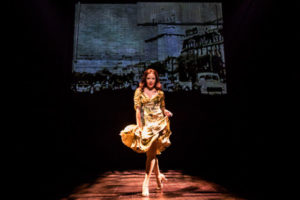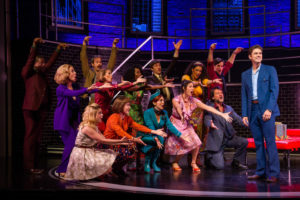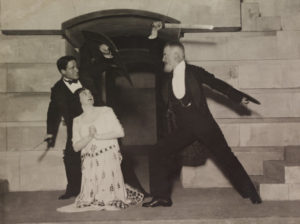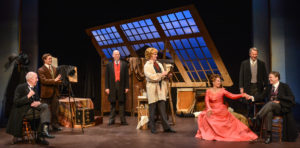 “The idea that one has long held of a person is apt to stop one’s eyes and ears.”
“The idea that one has long held of a person is apt to stop one’s eyes and ears.”
Marcel Proust, Within a Budding Grove (trans. C.K. Scott Moncrieff and Terence Kilmartin, courtesy of Daniel Mendelsohn)
Terry Teachout on the arts in New York City
In today’s Wall Street Journal I review the Broadway opening of Prince of Broadway and an important regional revival of Company. Here’s an excerpt.
* * *
 Anyone with a more than casual interest in theater needs no reminding that Harold Prince directed the original Broadway productions of “She Loves Me,” “Cabaret,” “Follies,” “A Little Night Music,” “Sweeney Todd,” “Evita,” “The Phantom of the Opera” and “Kiss of the Spider Woman.” That’s a staggering track record by any conceivable standard. Nevertheless, he isn’t exactly a household name west of the Hudson and hasn’t had a hit since the 1994 revival of “Show Boat,” so you can’t help but wonder how savvy a commercial proposition it was for the 89-year-old legend to put together a tribute to himself and call it “Prince of Broadway.”
Anyone with a more than casual interest in theater needs no reminding that Harold Prince directed the original Broadway productions of “She Loves Me,” “Cabaret,” “Follies,” “A Little Night Music,” “Sweeney Todd,” “Evita,” “The Phantom of the Opera” and “Kiss of the Spider Woman.” That’s a staggering track record by any conceivable standard. Nevertheless, he isn’t exactly a household name west of the Hudson and hasn’t had a hit since the 1994 revival of “Show Boat,” so you can’t help but wonder how savvy a commercial proposition it was for the 89-year-old legend to put together a tribute to himself and call it “Prince of Broadway.”
On the other hand, “Prince of Broadway” is not a budget-pulverizing extravaganza à la “Jerome Robbins’ Broadway” but a nine-singer revue at the 650-seat Samuel J. Friedman Theatre, which is a thousand seats smaller than the nearby house where “Phantom” has been minting money for the past 29 years. That Mr. Prince tried and failed to raise the money to put on a bigger, starrier show is no secret. Instead, he and Susan Stroman, his choreographer and co-director, have settled for a modestly scaled, slickly staged two-and-a-half-hour greatest-hits medley of numbers from 16 of the shows that Mr. Prince has directed and/or produced since 1955. Modest though it is, “Prince of Broadway” looks and sounds fabulous….
“Prince of Broadway” adds up to a pleasingly intimate musical revue full of shining moments, albeit one that feels rather more like a pledge-week TV special than a full-fledged Broadway show….
 One of the first musicals that Mr. Prince directed was, of course, Stephen Sondheim’s “Company,” and Barrington Stage Company, which has emerged in recent seasons as one of America’s top regional musical-comedy producers, is currently mounting a stirring revival of Mr. Sondheim’s now-classic study of the problems of postmodern marriage. Directed by Julianne Boyd, it stars Aaron Tveit as Robert, the commitment-phobic New York bachelor whose role was created by Dean Jones in the original 1970 production. I doubt there’s been a better Robert since Mr. Jones left the show. A true tenor with brilliantly gleaming high notes, Mr. Tveit is also a superior actor…
One of the first musicals that Mr. Prince directed was, of course, Stephen Sondheim’s “Company,” and Barrington Stage Company, which has emerged in recent seasons as one of America’s top regional musical-comedy producers, is currently mounting a stirring revival of Mr. Sondheim’s now-classic study of the problems of postmodern marriage. Directed by Julianne Boyd, it stars Aaron Tveit as Robert, the commitment-phobic New York bachelor whose role was created by Dean Jones in the original 1970 production. I doubt there’s been a better Robert since Mr. Jones left the show. A true tenor with brilliantly gleaming high notes, Mr. Tveit is also a superior actor…
Role for role, this is the best-sung “Company” I’ve ever heard—not just in regional theater, but anywhere….
* * *
Read the whole thing here.
Highlights from the original 2015 Japanese production of Prince of Broadway:
A video of a rehearsal for Barrington Stage’s revival of Company:
In my latest “Sightings” column, which appears in the online edition of today’s Wall Street Journal, I talk about one of the reasons why George Bernard Shaw is no longer widely appreciated as the great writer he was. Here’s an excerpt.
* * *
Plays are meant to be seen on a stage, not read off a page. That may sound like a truism, but you can’t know how true it is until you’ve seen a few of them. And while watching a film or TV version of a great play (like, say, Mike Nichols’ 1966 adaptation of “Who’s Afraid of Virginia Woolf?”) can be a surprisingly effective substitute for the real thing, most people don’t even get that far with classical theater. If you only know Shakespeare from the classroom, you’re likely to believe that his plays are snoozefests in which prissy men in tights strut around saying “prithee” and “forsooth.” In fact, most of them are swashbuckling blood-and-guts tragedies in which as Howard Dietz pithily observed in “That’s Entertainment,” “a ghost and a prince meet/And everyone ends in mincemeat.”
 If anything, George Bernard Shaw has suffered even more from the gap between page and stage. Throughout the last part of his long life, Shaw was a full-fledged international celebrity. Twenty of his plays were produced on Broadway between 1940 and 1960, many more than once, and some were also made into big-budget films with big-name casts. (The 1959 movie of “The Devil’s Disciple” starred Kirk Douglas, Burt Lancaster and Laurence Olivier.) Today, though, most people know him from “My Fair Lady,” Lerner and Loewe’s musical version of “Pygmalion,” and nothing else. To the extent that people under 60 know anything about his plays, they typically assume that they’re droningly intellectual….
If anything, George Bernard Shaw has suffered even more from the gap between page and stage. Throughout the last part of his long life, Shaw was a full-fledged international celebrity. Twenty of his plays were produced on Broadway between 1940 and 1960, many more than once, and some were also made into big-budget films with big-name casts. (The 1959 movie of “The Devil’s Disciple” starred Kirk Douglas, Burt Lancaster and Laurence Olivier.) Today, though, most people know him from “My Fair Lady,” Lerner and Loewe’s musical version of “Pygmalion,” and nothing else. To the extent that people under 60 know anything about his plays, they typically assume that they’re droningly intellectual….
The open secret of Shaw’s plays is that most of them are funny—not merely clever or witty, but laugh-out-loud funny. They’re full of good jokes, razor-sharp repartee and school-of-Wilde epigrams worthy of the master. Take, for example, “The Devil’s Disciple,” in which martyrdom is described as “the only way in which a man can become famous without ability.” Or “Major Barbara,” in which the villain, an arms dealer, utters this splendidly absurd pronouncement: “My religion? Well, my dear, I am a Millionaire. That is my religion.” Such lines may not look particularly funny in print, but they never fail to detonate with terrific comic effect when spoken out loud.
Why did a political propagandist like Shaw write comedies? Because he was a propagandist, one shrewd enough to know that he had to be amusing to get people to listen to his controversial ideas….
* * *
Read the whole thing here.
A scene from the 1938 film version of Pygmalion, starring Leslie Howard and Wendy Hiller, adapted for the screen by Shaw, and directed by Anthony Asquith and Howard:
Shaw talks about Russia and the United States in a 1937 radio broadcast filmed by British Movietone News:
Here’s my list of recommended Broadway, off-Broadway, and out-of-town shows, updated weekly. In all cases, I gave these shows favorable reviews (if sometimes qualifiedly so) in The Wall Street Journal when they opened. For more information, click on the title.
BROADWAY:
• Dear Evan Hansen (musical, PG-13, all shows sold out last week, reviewed here)
• Hamilton (musical, PG-13, Broadway transfer of off-Broadway production, all shows sold out last week, reviewed here)
IN EAST HADDAM, CONN.:
• Oklahoma! (musical, G/PG-13, closes Sept. 27, reviewed here)
IN NIAGARA-ON-THE-LAKE, ONTARIO:
• Dancing at Lughnasa (drama, G/PG-13, closes Oct. 15, reviewed here)
• The Madness of George III (drama, G/PG-13, closes Oct. 15, reviewed here)
CLOSING SOON ON BROADWAY:
• Groundhog Day (musical, G/PG-13, closes Sept. 17, reviewed here)
CLOSING NEXT WEEK OFF BROADWAY:
• Hamlet (Shakespeare, PG-13, closes Sept. 3, reviewed here)
CLOSING NEXT WEEK IN GARRISON, N.Y.:
• Pride and Prejudice (comedy, G, closes Sept. 4, reviewed here)
 CLOSING SUNDAY IN PETERBOROUGH, N.H.:
CLOSING SUNDAY IN PETERBOROUGH, N.H.:
• The Doctor’s Dilemma (Shaw, PG-13, reviewed here)
CLOSING SATURDAY IN GARRISON, N.Y.:
• Twelfth Night (Shakespeare, PG-13, reviewed here)
 “Behind Your Radio Dial,” a 1948 promotional film about the NBC radio network, directed by Edward J. Montagne, The film features on-camera appearances by Fred Allen, Bob Hope, Jim and Marian Jordan (who played Fibber and Molly McGee on NBC), H.V. Kaltenborn, Arturo Toscanini, and Fred Waring:
“Behind Your Radio Dial,” a 1948 promotional film about the NBC radio network, directed by Edward J. Montagne, The film features on-camera appearances by Fred Allen, Bob Hope, Jim and Marian Jordan (who played Fibber and Molly McGee on NBC), H.V. Kaltenborn, Arturo Toscanini, and Fred Waring:
(This is the latest in a series of arts-related videos that appear in this space each Monday, Wednesday, and Friday)
An ArtsJournal Blog